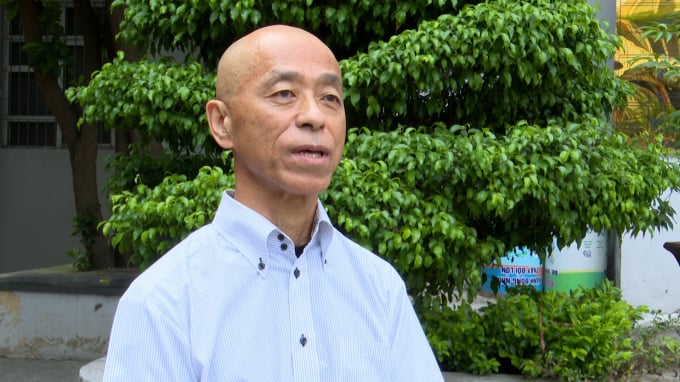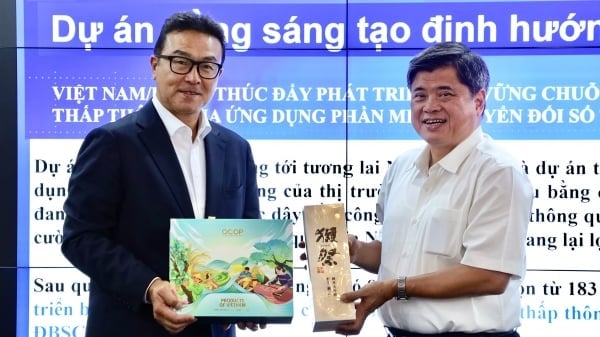May 25, 2025 | 12:30 GMT +7
May 25, 2025 | 12:30 GMT +7
Hotline: 0913.378.918
May 25, 2025 | 12:30 GMT +7
Hotline: 0913.378.918
Sharing with Vietnam Agriculture News, Mr. Morita Tateo said that China is currently the largest agricultural supplier in Japan. Thanks to a strong logistics system, their products’ prices are very competitive throughout the supply chain. However, unprecedented developments in the world such as Covid-19 and the conflict between Russia and Ukraine have shown the risks of concentration in a single source of supply.
China is a stable source of significant food suppliers, but other players in the food system are considered essential to ensure the diversification of the market. So, it is the right time to promote the expansion of the market share. Vietnam possesses strength in a large-scale cost competitive production system that may compete with China.

Mr. Morita Tateo, Advisor for Policy Formulation on Agriculture and Rural Development (JICA). Photo: Pham Huy.
From this perspective, it can be clearly seen that large-scale production with a competitive cost is a substantive approach for Vietnam agricultural producers to penetrate into the Japanese market.
What opportunities are there for Vietnamese agricultural products in the Japanese market, sir?
There are many Vietnamese communities in Japan, around half a million and the figure is increasing. They tend to consume the food of their own cultures. Some Vietnamese traders are exporting products that are not common in Japan for the Vietnamese population there. Those products are consumed by Vietnamese people at first, but many of those products may become common for general demand in Japan. So, there might be a good opportunity for indigenous products and food products to be gradually promoted in the Japanese market from now.
Which vital standards must Vietnamese agricultural products meet to set a foothold and capture a large and demanding market like Japan?
Safety and stability should be two keywords to promote the products in the Japanese market. JICA is promoting safe crop production by implementing technical assistance in Vietnam. Food safety is a common understanding but a very important requirement in the Japanese market.
There were some incidents disclosed in media several years ago about food unsafety and overdose of illegal chemical use in production. Therefore, the demand for imported foods reduced resulting in the increasing demand for imports in Japan.
The importance of safe crop production may not be fully understood among stakeholders in the supply chain in Vietnam. It is very easy to lose but takes long to establish reliability, so not only farmers but also single individuals engaging in the supply chain must understand the importance of food safety.

Vietnamese lychee is popular in Japan. Photo: Embassy of Vietnam in Japan.
Another vital issue is stability. Stable quality and stable quantity are significant factors to respond to the demands of people. It does not have to be high quality but a technique to produce stable quality at stable quantity is always required in the market.
Do you have any recommendations for authorities and partners in Vietnam to bring Vietnamese agricultural products to Japan?
For the authority, installing a clear specification of the products is an idea of the recommendation. The quality of agricultural products fluctuates on many factors such as weather conditions. Therefore, the standard of the specification is important. Even if the quality changes, specifications should be standardized, just like weight and size. If the authority can provide more standardized specifications and the suppliers follow the instruction, the reliability of Vietnamese products will be improved in the Japanese market. Especially from the Central Highland, cultivation of coffee is shifting from instant coffee variety of Robusta to the specialty variety of Arabica. If the coffee producers want to increase the sales of higher-priced products, they need to realize the importance of specification in order to differentiate their products from lower price products.
Thank you!
Translated by Linh Linh

(VAN) On May 23, Deputy Minister of Agriculture and Environment Tran Thanh Nam held a working session with a Japanese delegation on the application of digital technology in agricultural production.

(VAN) In the tranquil wetlands of Van Long, there are quiet souls who guard the forests, nurture the waters, and oversee every bird and troop of langurs as protecting the essence of a living heritage.

(VAN) WWF, GIZ, IUCN, UNDP call for biodiversity conservation and sustainable development must be regarded as a unity in strategies for a green future.

(VAN) On celebration of International Day for Biological Diversity, Deputy Minister Nguyen Quoc Tri called for practical actions to address nature and biodiversity conservation.

(VAN) Dr. Hoang Thi Thanh Nhan – Deputy Director of the Nature and Biodiversity Conservation Agency – highlighted this on the International Day for Biological Diversity, May 22, 2025.
![Ho Chi Minh city adapts to climate change: [2] Accelerating action](https://t.ex-cdn.com/nongnghiepmoitruong.vn/608w/files/chiqk/2025/05/22/4024-4220-bien-doi-khi-hau-1-100626_766.jpg)
(VAN) Clearly recognizing the challenges posed by climate change, Ho Chi Minh city has swiftly shaped its policies and implemented practical solutions to adapt.

(VAN) Rice straw is no longer just a discarded byproduct, but it is becoming a green resource that helps farmers in the Mekong Delta reduce emissions and promote circular, sustainable agriculture.